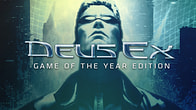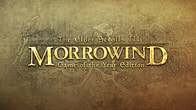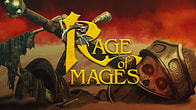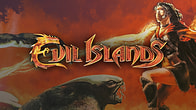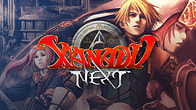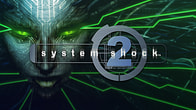Age of Decadence
I've put in over a hundred hours and have done five different playthroughs but still feel like there's a lot in the game I have yet to experience or discover. Unlike other RPGs where role-playing involves providing many ways to tackle a single problem, AoD opens up entirely different problems to tackle depending on what type of character you're role-playing. AoD gives so many different branching paths with so many different scenarios depending on character build and faction. Even among the different factions,which all completely alter the way the story unfolds for the player, there are major branching paths to choose from depending on your character build and choices. Add in a fantastic and brutal tactical combat system, an interesting and harsh post-apocalyptic world inspired by a fallen Roman Empire, and I think I can safely say Age of Decadence is one of the crowning achievements to rise out of the new age of crpgs.
Mount & Blade: Warband
A medieval sandbox rpg that strikes a great balance between giving the player freedom and giving the sandbox some structure as to not feel devoid of life or goals. Combat in the game is a combination of real time action with its own physics system and army and troop building management. Most battles involve around 100 or more troops(depending on settings) fighting at once in real time so it can get pretty hectic but still has some intricacies to its combat and strategy. The main draw of the game though are definitely the mods. The game was designed with mods in mind as even the base game is a considered a selectable mod upon booting the game. Fantasy universes like Star Wars, Middle Earth, Game of Thrones, Warhammer or different time periods ranging anywhere from 16th century Southeast Asia to 7th century Britain to the wild wild west in the 1860s are just a few examples of total conversion mods available for Warband. I was astonished by the amount of effort that fans put into some of these mods changing the entire feel of the game visually, aurally and mechanically. The Star Wars Conquests mod is probably my favorite Star Wars rpg I've ever played and it isn't even my favorite mod. That's a testament to how great some of the mods are. The game is pretty notorious for fans hitting the over 1000 hours played mark for a reason.
Arcanum: Of Steamworks and Magick Obscura
By far one of my favorite settings in RPGs, Arcanum takes place in a fantasy world, with the expected inclusions of elves,dwarves, orcs and magic, but occurs during the time of the industrial revolution. This leads to an interesting clash of new age technology vs old world of magic. The concept is very well realized in both the game's intricate world and its excellent character building options. Invest too much in technological skills like building firearms, explosives,or electrical devices and magic spells and enchanted pieces of equipment will be far less effective if usable at all. The character creation system also allows a huge number of role-playing options with fantastic reactivity. People will comment on your race, gender, whether you are technologically or magically inclined, your alignment,your personal relationship, whether or not you're wearing clothes and your reputation among other things throughout the game. Quests also provide a wide variety of options as there are always multiple ways to solve them based on your own character's knowledge, build or choices. The game's combat isn't stellar and can be very imbalanced, but I honestly didn't care just because of how fun making and living as a character in this world was.
Genforge 1
I love monster collecting/raising games like Pokémon, SMT and Dragon Quest Monsters. I also love CRPGs. When I heard that there was a CRPG where your only party members are creatures you've created, it instantly piqued my interests. Though it wasn't exactly what I thought it'd be, it does feel different from most RPGs of its kind since all your party members are disposable creatures you've given life to. You can choose to invest in your creations to make them stronger in attempt to create a more permanent party member, but the game tends to favor treating them like the disposable tools they are in the game's world. Combat is fun but nothing special. The combat is turned based with action points very reminiscent of Fallout 1+2. The story and its world are the real reasons for playing the game. They're so well done,it makes glossing over the lackluster visuals very easy. The game isn't much of a looker. It's a low budget indie game and it shows. Aside from the title track, the rest of the game doesn't even have music! The strength of the game's writing alone kept me engaged and desiring more. I jumped to the second and third games almost immediately one after another before finally taking a break. The series spans five games and even though the other games are better mechanically and visually, the first game easily captured the feeling of mystery and intrigue best.
Fallout
The first CRPG I tried involved learning some basic DnD terminology and rules but as a teenager I lacked the attention span to learn them and decided to move on. Many years later I finally gave the first Fallout a try. It was far more accessible, had a straight-forward turn based combat system with satisfying death animations, an interesting post-apocalyptic setting with its own distinctive characteristics and still had all of the core elements that make CRPGs so great. Being weaned on JRPGs, the flexible character creation system that allowed a good mixture of various combat builds and role-playing options, reactivity from its inhabitants based on choices in and out of dialogue and choices that actually affect the outcome of the story was a delightful new experience. Fallout 1 was a great gateway CRPG for me. It's accessible but with plenty of depth and a great aesthetic style that few RPGs can match.
Chrono Trigger
It's hard to explain why this is one of my favorite games of all time. It doesn't have any particular unique or standout features but all of its components come together so perfectly and it is so well paced that it somehow bests other games that have done some of its features better. I feel like all the RPGs that Squaresoft and Enix made prior culminated into this perfect dream project to reach the pinnacle of 2D RPGs of its era.
Shin Megami Tensei: Nocturne
Every RPG fan should play at least one Shin Megami Tensei title and if they only play one, it should be Nocturne. It has all the features that make SMT fun: demon fusion and skill inheritance,press turn battle system, post-apocalyptic world overrun by demons, actual dungeons and multiple endings based on your choices. But it has one standout feature that other SMT games have been unable to match: its atmosphere. In other SMT games, the setting may be bleak but humanity still exists. In Nocturne, humanity is dead. There's this great sense of desolation and isolation in the world that none of the other games possess.
Ogre Battle 64: Person of Lordly Caliber
People often think of Tactics Ogre when they hear Ogre Battle, but the original real time strategy rpg series offers an experience that a lot of other RPGs don't. Most RPGs focus on a smaller group of individuals that you can directly control but Ogre Battle 64 had you focus on controlling entire squadrons that you had indirect control of in combat. How you geared your troops, the squad's formation, the squadron leader, and their set tactics determined how well they would do. The game had a more serious tone than most Japanese RPGs, offered branching paths, had a reputation system based on actions and a number of companions to recruit that would alter the ending you received. I may have a slight bias for OB64 over the original simply because the N64 was pretty scarce for RPGs and this was my oasis in that desert.
Xenoblade Chronicles
After playing the game for 30-40 minutes the first time, I decided to drop the game because I couldn't wrap my head around why anyone would want to combine MMO like gameplay with the structure of a jrpg. After seeing raving reviews I decided to give it another shot and finally something clicked. Xenoblade is by no means an open world game, as it has a linear story, but it manages to capture the feeling of one because of how open everything is to explore. The game encourages exploration by not penalizing the player for dying and constantly rewarding the player's curiosity with experience for discovering new areas, new items to fill out your collectopaedia or unique monsters to kill. XC is a beautiful blending of open exploration and structured story.
Lufia II: Rise of the Sinistrals
I can't really think of any jrpgs that have puzzles as good as Lufia II's. I'm not even much of a puzzle fan, but the puzzles really made the dungeons in the game a lot more enjoyable than most. It wasn't just about trudging through one monster encounter after another with the occasional puzzle thrown in. The puzzles were an integral part of the dungeon design and often times more important than any of the monster encounters. Of course, for the traditional dungeon crawling fan there was also the amazing Ancient Cave, which almost feels like a game in itself. Forcing the player to start at level 1 each time they entered the 100 floor dungeon with none of his gear or abilities available was a really challenging and rewarding dungeon crawling experience.
--VOTE INFO START
<FULL POINT GAMES 2 points>
{HIGHLIGHT 3 points} Age of Decadence
{UNDERRATED 4 points} Mount & Blade: Warband
Arcanum: Of Steamworks and Magick Obscura
Geneforge 1
Fallout
Chrono Trigger
Shin Megami Tensei: Nocturne
Ogre Battle 64: Person of Lordly Caliber
Lufia II: Rise of the Sinistrals
Xenoblade Chronicles
<HONORABLE MENTIONS 1 point>
Secret of Evermore
Earthbound
Super Mario RPG: Legend of the Seven Stars
Ogre Battle: The March of the Black Queen
Shin Megami Tensei: Strange Journey
--VOTE INFO END--
I've put in over a hundred hours and have done five different playthroughs but still feel like there's a lot in the game I have yet to experience or discover. Unlike other RPGs where role-playing involves providing many ways to tackle a single problem, AoD opens up entirely different problems to tackle depending on what type of character you're role-playing. AoD gives so many different branching paths with so many different scenarios depending on character build and faction. Even among the different factions,which all completely alter the way the story unfolds for the player, there are major branching paths to choose from depending on your character build and choices. Add in a fantastic and brutal tactical combat system, an interesting and harsh post-apocalyptic world inspired by a fallen Roman Empire, and I think I can safely say Age of Decadence is one of the crowning achievements to rise out of the new age of crpgs.
Mount & Blade: Warband
A medieval sandbox rpg that strikes a great balance between giving the player freedom and giving the sandbox some structure as to not feel devoid of life or goals. Combat in the game is a combination of real time action with its own physics system and army and troop building management. Most battles involve around 100 or more troops(depending on settings) fighting at once in real time so it can get pretty hectic but still has some intricacies to its combat and strategy. The main draw of the game though are definitely the mods. The game was designed with mods in mind as even the base game is a considered a selectable mod upon booting the game. Fantasy universes like Star Wars, Middle Earth, Game of Thrones, Warhammer or different time periods ranging anywhere from 16th century Southeast Asia to 7th century Britain to the wild wild west in the 1860s are just a few examples of total conversion mods available for Warband. I was astonished by the amount of effort that fans put into some of these mods changing the entire feel of the game visually, aurally and mechanically. The Star Wars Conquests mod is probably my favorite Star Wars rpg I've ever played and it isn't even my favorite mod. That's a testament to how great some of the mods are. The game is pretty notorious for fans hitting the over 1000 hours played mark for a reason.
Arcanum: Of Steamworks and Magick Obscura
By far one of my favorite settings in RPGs, Arcanum takes place in a fantasy world, with the expected inclusions of elves,dwarves, orcs and magic, but occurs during the time of the industrial revolution. This leads to an interesting clash of new age technology vs old world of magic. The concept is very well realized in both the game's intricate world and its excellent character building options. Invest too much in technological skills like building firearms, explosives,or electrical devices and magic spells and enchanted pieces of equipment will be far less effective if usable at all. The character creation system also allows a huge number of role-playing options with fantastic reactivity. People will comment on your race, gender, whether you are technologically or magically inclined, your alignment,your personal relationship, whether or not you're wearing clothes and your reputation among other things throughout the game. Quests also provide a wide variety of options as there are always multiple ways to solve them based on your own character's knowledge, build or choices. The game's combat isn't stellar and can be very imbalanced, but I honestly didn't care just because of how fun making and living as a character in this world was.
Genforge 1
I love monster collecting/raising games like Pokémon, SMT and Dragon Quest Monsters. I also love CRPGs. When I heard that there was a CRPG where your only party members are creatures you've created, it instantly piqued my interests. Though it wasn't exactly what I thought it'd be, it does feel different from most RPGs of its kind since all your party members are disposable creatures you've given life to. You can choose to invest in your creations to make them stronger in attempt to create a more permanent party member, but the game tends to favor treating them like the disposable tools they are in the game's world. Combat is fun but nothing special. The combat is turned based with action points very reminiscent of Fallout 1+2. The story and its world are the real reasons for playing the game. They're so well done,it makes glossing over the lackluster visuals very easy. The game isn't much of a looker. It's a low budget indie game and it shows. Aside from the title track, the rest of the game doesn't even have music! The strength of the game's writing alone kept me engaged and desiring more. I jumped to the second and third games almost immediately one after another before finally taking a break. The series spans five games and even though the other games are better mechanically and visually, the first game easily captured the feeling of mystery and intrigue best.
Fallout
The first CRPG I tried involved learning some basic DnD terminology and rules but as a teenager I lacked the attention span to learn them and decided to move on. Many years later I finally gave the first Fallout a try. It was far more accessible, had a straight-forward turn based combat system with satisfying death animations, an interesting post-apocalyptic setting with its own distinctive characteristics and still had all of the core elements that make CRPGs so great. Being weaned on JRPGs, the flexible character creation system that allowed a good mixture of various combat builds and role-playing options, reactivity from its inhabitants based on choices in and out of dialogue and choices that actually affect the outcome of the story was a delightful new experience. Fallout 1 was a great gateway CRPG for me. It's accessible but with plenty of depth and a great aesthetic style that few RPGs can match.
Chrono Trigger
It's hard to explain why this is one of my favorite games of all time. It doesn't have any particular unique or standout features but all of its components come together so perfectly and it is so well paced that it somehow bests other games that have done some of its features better. I feel like all the RPGs that Squaresoft and Enix made prior culminated into this perfect dream project to reach the pinnacle of 2D RPGs of its era.
Shin Megami Tensei: Nocturne
Every RPG fan should play at least one Shin Megami Tensei title and if they only play one, it should be Nocturne. It has all the features that make SMT fun: demon fusion and skill inheritance,press turn battle system, post-apocalyptic world overrun by demons, actual dungeons and multiple endings based on your choices. But it has one standout feature that other SMT games have been unable to match: its atmosphere. In other SMT games, the setting may be bleak but humanity still exists. In Nocturne, humanity is dead. There's this great sense of desolation and isolation in the world that none of the other games possess.
Ogre Battle 64: Person of Lordly Caliber
People often think of Tactics Ogre when they hear Ogre Battle, but the original real time strategy rpg series offers an experience that a lot of other RPGs don't. Most RPGs focus on a smaller group of individuals that you can directly control but Ogre Battle 64 had you focus on controlling entire squadrons that you had indirect control of in combat. How you geared your troops, the squad's formation, the squadron leader, and their set tactics determined how well they would do. The game had a more serious tone than most Japanese RPGs, offered branching paths, had a reputation system based on actions and a number of companions to recruit that would alter the ending you received. I may have a slight bias for OB64 over the original simply because the N64 was pretty scarce for RPGs and this was my oasis in that desert.
Xenoblade Chronicles
After playing the game for 30-40 minutes the first time, I decided to drop the game because I couldn't wrap my head around why anyone would want to combine MMO like gameplay with the structure of a jrpg. After seeing raving reviews I decided to give it another shot and finally something clicked. Xenoblade is by no means an open world game, as it has a linear story, but it manages to capture the feeling of one because of how open everything is to explore. The game encourages exploration by not penalizing the player for dying and constantly rewarding the player's curiosity with experience for discovering new areas, new items to fill out your collectopaedia or unique monsters to kill. XC is a beautiful blending of open exploration and structured story.
Lufia II: Rise of the Sinistrals
I can't really think of any jrpgs that have puzzles as good as Lufia II's. I'm not even much of a puzzle fan, but the puzzles really made the dungeons in the game a lot more enjoyable than most. It wasn't just about trudging through one monster encounter after another with the occasional puzzle thrown in. The puzzles were an integral part of the dungeon design and often times more important than any of the monster encounters. Of course, for the traditional dungeon crawling fan there was also the amazing Ancient Cave, which almost feels like a game in itself. Forcing the player to start at level 1 each time they entered the 100 floor dungeon with none of his gear or abilities available was a really challenging and rewarding dungeon crawling experience.
--VOTE INFO START
<FULL POINT GAMES 2 points>
{HIGHLIGHT 3 points} Age of Decadence
{UNDERRATED 4 points} Mount & Blade: Warband
Arcanum: Of Steamworks and Magick Obscura
Geneforge 1
Fallout
Chrono Trigger
Shin Megami Tensei: Nocturne
Ogre Battle 64: Person of Lordly Caliber
Lufia II: Rise of the Sinistrals
Xenoblade Chronicles
<HONORABLE MENTIONS 1 point>
Secret of Evermore
Earthbound
Super Mario RPG: Legend of the Seven Stars
Ogre Battle: The March of the Black Queen
Shin Megami Tensei: Strange Journey
--VOTE INFO END--


